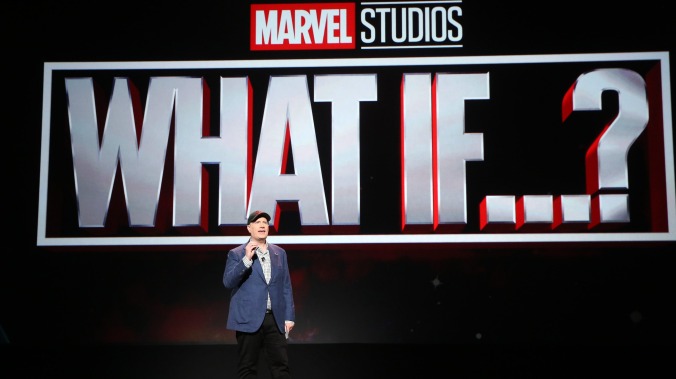Marvel’s TV experiment wasn’t a failure—until Marvel decided it was
In the wake of its Daredevil debacle, Marvel now wants to make its Disney Plus shows the way traditional TV networks do

In a surprising move for the generally confident and difficult-to-maneuver battleship that is Marvel Studios, the company today announced that it is going back to the proverbial drawing board on Daredevil: Born Again, its reboot (of sorts) of Netflix’s Daredevil series with stars Charlie Cox and Vincent D’Onofrio returning to reprise their roles as Matt Murdock and Wilson Fisk. Half of the show’s first season was mostly finished before the WGA strike put everyone on pause, and now head writers Chris Ord and Matt Corman (the duo behind USA’s Covert Affairs) have been let go, along with every director attached to the series.
This reportedly came after Marvel Studios boss Kevin Feige saw the first few episodes and wasn’t happy with what Ord and Corman had come up with, which was apparently a jokey legal show that didn’t involve Cox putting on the Daredevil suit until four episodes in. And now, in reaction to this and to how crummy Secret Invasion was, Marvel is apparently overhauling its entire TV development system by making it less like the movies and more like … television. That means hiring actual showrunners, writing actual pilot episodes, and mapping out potentially multiple seasons before actually making the thing, instead of envisioning the series as eight-hour TV movies that only exist to lay the groundwork for theatrical movies later on.
It’s tempting to interpret this as Marvel Studios finally recognizing its faults and acknowledging that its attempt to turn its Disney+ shows into stretched-out movies was a failure, but Marvel’s TV shows weren’t failures until Marvel decided they were failures—which is to say this thing happening right now—and it requires rewriting history to say that this is the problem and it has always been the problem.
Secret Invasion was a mess, with each episode feeling like it was simply moving pieces around on a board until they were in the spot they needed to be in order to make a predetermined plot point happen (so-and-so becomes a Super Skrull, so-and-so dies, and ultimately it doesn’t mean anything or go anywhere), but She-Hulk: Attorney At Law (the last Marvel show to come out before Secret Invasion) was fun and mostly operated within a traditional TV structure.
Say what you will about how successful She-Hulk was at any of this, but it had individual episodes with their own stories and B-plots (a big meta joke in the finale is that She-Hulk realizes the B-plot is stupid and she breaks the fourth wall to change it), and it was actually informed by the events of the MCU movies without existing just to serve them—unlike, say, Marvel TV’s The Falcon And The Winter Soldier.
None of this is to say that Marvel’s Disney+ shows have all been good and that there was nothing the studio needed to fix about them, as even an inoffensively entertaining series like Hawkeye was just a six-hour movie and not an actual TV show. But suggesting that the shows don’t work, that they’ve never worked, and that this is why, simply isn’t true. WandaVision, Marvel Studios’ first proper TV show, was completely devoted to traditional TV structure and used it as part of its narrative. Marvel clearly set out to make a TV show and then made a TV show.
Perhaps people are conflating the problems that Marvel’s TV shows have been having with the problems that a different batch of TV shows within the Disney Empire have been having, because Star Wars desperately needs this kind of restructuring much more than Marvel Studios does. The Mandalorian has largely been good at being a TV show, as was Andor in the one season we’ve seen. But Obi-Wan, The Book Of Boba Fett, and Ahsoka have all been much more troubled and unsatisfying attempts to do the “this is an X-hour movie” thing—which is to say that they tell one story, paced as a single story, and don’t make good use of the relative expansiveness afforded by TV.
Still, taking a step back and rethinking things isn’t a bad idea for Marvel, which has been largely rudderless since wrapping up The Infinity Saga and losing the easily graspable hook of “we need to stop this one bad guy from doing this bad thing.” That problem isn’t, and never has been, solely at the feet of the Disney+ shows, but letting these things bake a little longer can’t hurt. It may even give Marvel some time to realize that, you know, Deborah Ann Woll and Elden Henson should absolutely be in the new Daredevil show.